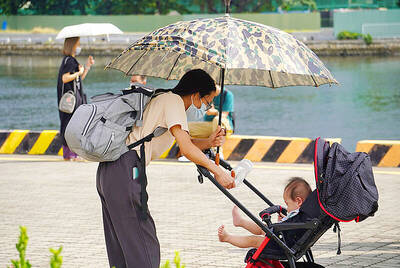The Cabinet yesterday approved amendments that would remove obstacles to workers forming unions and going on strike.
Current legislation stipulates that union members vote on whether to support a strike motion by attending an assembly and voting in person. If the amendments pass, union members would be able to vote by other means.
However, even if the amendments pass, current restrictions on unions calling for a strike in disputes over so-called “rights items,” such as defaults on wages and overtime pay, would remain in place.
Council of Labor Affairs (CLA) Minister Jennifer Wang (王如玄) told a press conference after the weekly Cabinet meeting that the amendments would establish a rational mechanism for workers to exert their right to strike.
She said the amendments would affect the Settlement of Labor-Management Disputes Act (勞資爭議處理法), the Labor Union Act (工會法), the Teachers’ Act (教師法), the Educational Fundamental Act (教育基本法) and the University Act (大學法).
Current limitations on strikes and procedures for launching a strike are written in a brief article — Article 26 of the Labor Union Law.
Under the article, no strike may be declared to settle disputes on “adjustment items” — changes in working conditions such as wages, retirement pensions and working hours — unless mediation procedures have failed and the strike motion is favored by a majority of the labor union by secret vote in a general meeting.
In terms of “rights items,” currently disputes are handled only by mediation.
If the amendment passes, disputes on “rights items,” which Wang said accounted for more than 90 percent of the disputes, could be referred to arbitration if mediation failed.
To ensure the right of unions to take legal action — meaning a strike or other measures — that impede the normal operations of their firms to negotiate with management, the amendments stipulate that workers should be immune from civil and criminal responsibility for joining any actions.
The relaxed measures, however, would not apply to all workers.
The proposed amendments would stipulate that staffers with institutions under the Ministry of National Defense would not be allowed to form unions.
Public servants would be allowed to organize unions if the Examination Yuan’s Ministry of Civil Servants proposes a bill to regulate their activities, but the Executive Yuan suggested that public servants should be denied the right to strike.
The Cabinet-proposed amendments grant teachers the right to form unions, but not the right to strike.
The amendments would also limit the right to strike for workers connected to public safety.
Trade unions in water, electric and gas utilities, medical institutions, financial institutions, such as the Taiwan Stock Exchange, Taiwan Futures Exchange, Taiwan Depository & Clearing Corp, GRETAI Securities Market and Financial Information Service Co Ltd, would still be required to provide a “minimum level” of service in the event of a strike.
The restriction would also be applied to Type 1 telecom operators, namely Chunghwa Telecom, as it would be required to provide basic services for emergency lines — 110, 123, 119, 165 and its backbone network system.
Also See: Teachers triumph in labor struggle

DEFENDING DEMOCRACY: Taiwan shares the same values as those that fought in WWII, and nations must unite to halt the expansion of a new authoritarian bloc, Lai said The government yesterday held a commemoration ceremony for Victory in Europe (V-E) Day, joining the rest of the world for the first time to mark the anniversary of the end of World War II in Europe. Taiwan honoring V-E Day signifies “our growing connections with the international community,” President William Lai (賴清德) said at a reception in Taipei on the 80th anniversary of V-E Day. One of the major lessons of World War II is that “authoritarianism and aggression lead only to slaughter, tragedy and greater inequality,” Lai said. Even more importantly, the war also taught people that “those who cherish peace cannot

STEADFAST FRIEND: The bills encourage increased Taiwan-US engagement and address China’s distortion of UN Resolution 2758 to isolate Taiwan internationally The Presidential Office yesterday thanked the US House of Representatives for unanimously passing two Taiwan-related bills highlighting its solid support for Taiwan’s democracy and global participation, and for deepening bilateral relations. One of the bills, the Taiwan Assurance Implementation Act, requires the US Department of State to periodically review its guidelines for engagement with Taiwan, and report to the US Congress on the guidelines and plans to lift self-imposed limitations on US-Taiwan engagement. The other bill is the Taiwan International Solidarity Act, which clarifies that UN Resolution 2758 does not address the issue of the representation of Taiwan or its people in

The Philippines yesterday criticized a “high-risk” maneuver by a Chinese vessel near the disputed Scarborough Shoal (Huangyan Island, 黃岩島) in a rare incident involving warships from the two navies. The Scarborough Shoal — a triangular chain of reefs and rocks in the contested South China Sea — has been a flash point between the countries since China seized it from the Philippines in 2012. Taiwan also claims the shoal. Monday’s encounter took place approximately 11.8 nautical miles (22km) southeast” of the Scarborough Shoal, the Philippine military said, during ongoing US-Philippine military exercises that Beijing has criticized as destabilizing. “The Chinese frigate BN 554 was

The number of births in Taiwan fell to an all-time monthly low last month, while the population declined for the 16th consecutive month, Ministry of the Interior data released on Friday showed. The number of newborns totaled 8,684, which is 704 births fewer than in March and the lowest monthly figure on record, the ministry said. That is equivalent to roughly one baby born every five minutes and an annual crude birthrate of 4.52 per 1,000 people, the ministry added. Meanwhile, 17,205 deaths were recorded, resulting in a natural population decrease of 8,521, the data showed. More people are also leaving Taiwan, with net